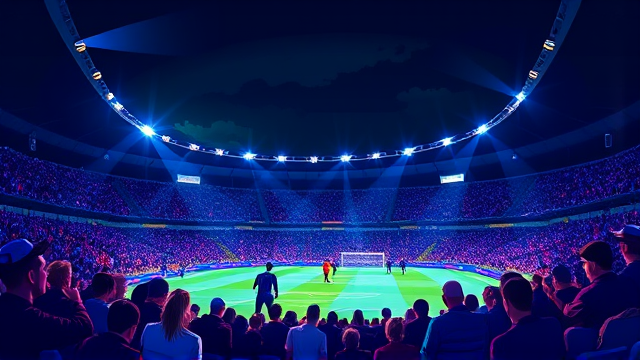NI down but not out after 'sore' Germany defeat
The full-time whistle at Windsor Park provoked a complex symphony of emotions that perfectly encapsulated Northern Ireland's heartbreaking yet heroic 1-0 defeat to Germany in World Cup qualifying—first came the jeers, raw and immediate, directed at match officials whose baffling decision to add only two minutes of stoppage time felt like a statistical anomaly in a match where every second mattered, before those boos transformed into thunderous applause celebrating a young squad that had pushed one of football's traditional powerhouses to the absolute brink. This wasn't merely a narrow loss; it was a masterclass in tactical discipline and raw passion from Michael O'Neill's side, who in his 100th game in charge engineered a performance that echoed through Windsor Park's storied history, where the ghosts of past giant-killings seemed to whisper encouragement from the stands.The match ultimately hinged on those razor-thin margins that separate footballing glory from agonizing what-ifs—had Paddy McNair's positioning been a fraction more disciplined before Dan Ballard's disallowed effort, we'd be discussing one of the greatest results in recent Northern Irish history; had the ball behaved with normal physics rather than freakishly bouncing off Nick Woltemade's shoulder into the net, we'd be analyzing a gritty goalless draw; had Callum Marshall's late chance fallen to his stronger foot, we'd be celebrating a dramatic equalizer. The absence of suspended Conor Bradley—a victim of what O'Neill rightly labeled a 'soft' yellow against Slovakia—created a tangible void in both defensive solidity and attacking impetus, reminiscent of how Liverpool might struggle without Trent Alexander-Arnold's creative spark, highlighting how suspension misfortune can reshape international fixtures.Germany, while far from their vintage best that delivered World Cup triumphs in 2014, demonstrated the clinical efficiency that separates elite nations from emerging forces, with Julian Nagelsmann admitting relief rather than satisfaction in his post-match comments, acknowledging his team had been forced into a defensive shell during a second-half onslaught where Northern Ireland's relentless pressure evoked memories of their famous victory over England in 2005. O'Neill's tactical adjustment at halftime transformed the contest, shifting from what he described as a first half lacking belief to a second period where his players operated with the conviction of veterans, their energy seemingly fueled by Windsor Park's electrifying atmosphere that O'Neill said 'carried' his tired squad through the final stages.The statistical narrative reveals fascinating subplots—O'Neill's wry observation that Germany actually played more long balls than his team subverting expectations about traditional footballing hierarchies, while expected goals models would likely show this as a match Northern Ireland deserved at least a point from based on chance quality and overall performance. Looking forward, while automatic qualification now appears distant with Germany establishing firm control of Group A, the battle for second place and a guaranteed play-off remains fiercely alive ahead of November's crucial fixtures away to Slovakia and at home against Luxembourg, with Northern Ireland's status as Nations League group winners providing an additional safety net that could prove decisive in the qualification calculus.This performance, despite the result, signals something profoundly important for Northern Irish football's future—a generation of players including Bradley, Ballard, and Trai Hume demonstrating they can compete with Europe's elite without inferiority complexes, suggesting that the development pathway is producing talent capable of sustaining competitive performances at the highest level. The emotional resonance of this defeat mirrors pivotal moments in football history where narrow losses against superior opposition ultimately built foundation for future success, much like Croatia's valiant efforts in major tournaments before their 2018 World Cup final appearance, or Greece's gradual development before their stunning Euro 2004 triumph. In the cold analysis of league tables this registers as three points dropped, but in the broader narrative of Northern Irish football it represents a cultural touchstone—proof that their footballing identity, built on collective spirit and tactical intelligence, can unsettle even the most technically gifted opponents, leaving this young squad undoubtedly down but demonstrably not out in their World Cup qualification journey.
Latest News
For Chatham Town, a seventh-tier football club whose last significant FA Cup run concluded in the 1888/89 season when they reached the quarter-finals—a feat
16 minutes ago0 comments
In a breathtaking display of raw athleticism that evoked memories of Barry Sanders' most electrifying runs, Atlanta Falcons rookie sensation Bijan Robinson
46 minutes ago0 comments
The Arizona Cardinals' 31-27 loss to the Indianapolis Colts on Sunday felt less like another notch in their four-game losing streak and more like a seismic
1 hour ago0 comments
The NHL’s regular season is heating up, and if last night’s action is any indicator, we’re in for another wild ride.
1 hour ago0 comments
The NFL's Monday Night Football doubleheader concludes with a compelling NFC showdown between the Chicago Bears and Washington Commanders at Northwest Stadium,
1 hour ago0 comments
The Miami Dolphins' season continues to unravel in spectacular fashion, with quarterback Tua Tagovailoa's postgame comments following Sunday's 29-27 loss to
2 hours ago1 comments
In a stunning twist of fate that will be debated in Russian hockey circles for years, SKA Saint Petersburg snapped Avtomobilist Yekaterinburg's formidable
2 hours ago0 comments
In a dramatic Monday night showdown that will be debated in KHL taverns for years, SKA St.
2 hours ago0 comments
It’s quiet here...Start the conversation by leaving the first comment.
